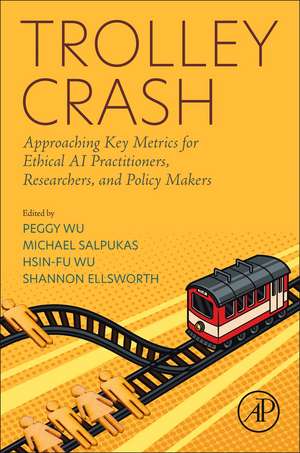Trolley Crash: Approaching Key Metrics for Ethical AI Practitioners, Researchers, and Policy Makers
Editat de Peggy Wu, Michael Salpukas, Hsin-Fu Wu, Shannon Ellsworthen Limba Engleză Paperback – 30 ian 2024
Trolley Crash: Approaching Key Metrics for Ethical AI Practitioners, Researchers, and Policy Makers provides audiences with a catalogue of perspectives and methodologies from the latest research in ethical computing. This work integrates philosophical and computational approaches into a unified framework for ethical reasoning in the current AI landscape, specifically focusing on approaches for developing metrics. Written for AI researchers, ethicists, computer scientists, software engineers, operations researchers, and autonomous systems designers and developers, Trolley Crash will be a welcome reference for those who wish to better understand metrics for ethical reasoning in autonomous systems and related computational applications.
- Presents a comparison between human oversight and ethical simulation in robots
- Introduces approaches for measuring, evaluating, and auditing ethical AI
- Investigates how AI and technology are changing human behavior
Preț: 623.86 lei
Preț vechi: 930.66 lei
-33% Nou
Puncte Express: 936
Preț estimativ în valută:
119.38€ • 124.95$ • 99.36£
119.38€ • 124.95$ • 99.36£
Carte tipărită la comandă
Livrare economică 24 martie-07 aprilie
Preluare comenzi: 021 569.72.76
Specificații
ISBN-13: 9780443159916
ISBN-10: 0443159912
Pagini: 264
Dimensiuni: 152 x 229 x 19 mm
Greutate: 0.36 kg
Editura: ELSEVIER SCIENCE
ISBN-10: 0443159912
Pagini: 264
Dimensiuni: 152 x 229 x 19 mm
Greutate: 0.36 kg
Editura: ELSEVIER SCIENCE
Cuprins
1. Introduction
Michael R. Salpukas, Peggy Wu, Shannon Ellsworth and Hsin-Fu Wu
2. Terms and References
Michael R. Salpukas, Peggy Wu, Shannon Ellsworth and Hsin-Fu Wu
How is AI Changing Human Behavior?
3. Boiling the Frog: Ethical Leniency due to Prior Exposure to Technology
Noah Ari, Nusrath Jahan, Johnathan Mell and Pamela Wisniewski
Human Oversight vs. Ethical Simulation in Robots
4. Automated Ethical Reasoners Must Be Interpretation-Capable
John Licato
5. Towards Unifying the Descriptive and Prescriptive for Machine Ethics
Taylor Olson
6. Competent Moral Reasoning in Robot Applications: Inner Dialog as a Step Towards Artificial Phronesis
John Paul Sullins III, Antonio Chella and Arianna Pipitone
Measuring, Evaluating, and Auditing Ethical AI
7. Autonomy Compliance with Doctrine and Ethics Ontological Frameworks
Donald P. Brutzman, Hsin-Fu Wu, Curtis Blais and Carl Andersen
8. Meaningful Human Control and Ethical Neglect Tolerance; Initial Thoughts on How to Define Model and Measure Them
Christopher A. Miller and Marcel Baltzer
9. Continuous automation approach for autonomous Ethics Based Audit of AI Systems
Guy Lupo, Quoc Bao Vo and Natania Locke
10. A Tiered Approach for Ethical AI Evaluation Metrics
Peggy Wu, Hsin-Fu Wu, Brett Israelsen and Robert Grabowski
11. Designing Meaningful Metrics for Demonstrating Ethical Supervision of Autonomous Systems
Donald P. Brutzman and Curtis Blais
Research Topics and Methods: Ethical AI and Big Questions
12. Obtaining Hints to Understand Language Model-based Moral Decision Making by Generating Consequences of Acts
Rafal Rzepka and Kenji Araki
13. Emerging Issues and Challenges
Michael R. Salpukas, Peggy Wu, Shannon Ellsworth and Hsin-Fu Wu
Acronyms Appendix
Hsin-Fu Wu
Michael R. Salpukas, Peggy Wu, Shannon Ellsworth and Hsin-Fu Wu
2. Terms and References
Michael R. Salpukas, Peggy Wu, Shannon Ellsworth and Hsin-Fu Wu
How is AI Changing Human Behavior?
3. Boiling the Frog: Ethical Leniency due to Prior Exposure to Technology
Noah Ari, Nusrath Jahan, Johnathan Mell and Pamela Wisniewski
Human Oversight vs. Ethical Simulation in Robots
4. Automated Ethical Reasoners Must Be Interpretation-Capable
John Licato
5. Towards Unifying the Descriptive and Prescriptive for Machine Ethics
Taylor Olson
6. Competent Moral Reasoning in Robot Applications: Inner Dialog as a Step Towards Artificial Phronesis
John Paul Sullins III, Antonio Chella and Arianna Pipitone
Measuring, Evaluating, and Auditing Ethical AI
7. Autonomy Compliance with Doctrine and Ethics Ontological Frameworks
Donald P. Brutzman, Hsin-Fu Wu, Curtis Blais and Carl Andersen
8. Meaningful Human Control and Ethical Neglect Tolerance; Initial Thoughts on How to Define Model and Measure Them
Christopher A. Miller and Marcel Baltzer
9. Continuous automation approach for autonomous Ethics Based Audit of AI Systems
Guy Lupo, Quoc Bao Vo and Natania Locke
10. A Tiered Approach for Ethical AI Evaluation Metrics
Peggy Wu, Hsin-Fu Wu, Brett Israelsen and Robert Grabowski
11. Designing Meaningful Metrics for Demonstrating Ethical Supervision of Autonomous Systems
Donald P. Brutzman and Curtis Blais
Research Topics and Methods: Ethical AI and Big Questions
12. Obtaining Hints to Understand Language Model-based Moral Decision Making by Generating Consequences of Acts
Rafal Rzepka and Kenji Araki
13. Emerging Issues and Challenges
Michael R. Salpukas, Peggy Wu, Shannon Ellsworth and Hsin-Fu Wu
Acronyms Appendix
Hsin-Fu Wu
